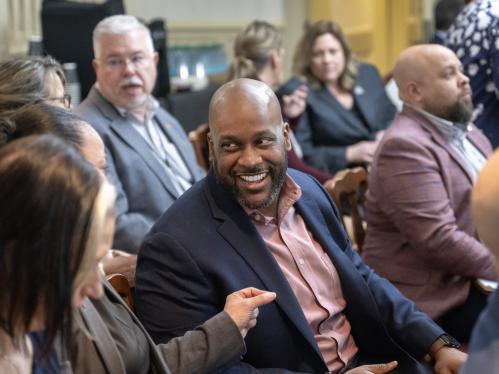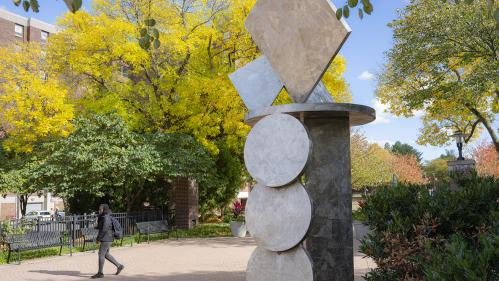New Brunswick Faculty Council
The New Brunswick Faculty Council (NBFC) is a key shared governance body from which the Rutgers–New Brunswick chancellor seeks and receives advice on issues affecting and relevant to the faculty and campus.

Welcome to Rutgers–New Brunswick
Whether you're a first-year student or well on the way to your degree, Rutgers is a big place with limitless possibilities. Click below to find handy tips to start your semester off right.

Office of the Chancellor:
Shared Governance
Guided by Chancellor Conway's vision, Rutgers–New Brunswick embraces shared leadership and collective purpose.
Our Vision
At the heart of the Rutgers–New Brunswick community lies a steadfast commitment to the principles of shared governance—a commitment that honors the collective wisdom, diverse perspectives, and distinct roles of our faculty, staff, students, and administration. As chancellor, I affirm our shared responsibility to steward the mission of Rutgers–New Brunswick with integrity, inclusion, and a forward-looking spirit.
Our vision for shared governance is rooted in a culture of mutual trust, transparency, and open communication—one where all voices are heard, valued, and meaningfully engaged in shaping the strategies, policies, and priorities that define our academic life and guide our institutional direction.
We aspire to build a governance structure that is collaborative and inclusive, where academic freedom, institutional accountability, and informed decision-making coalesce to advance our educational mission, uphold our values, and serve the public good. Together, we will strengthen systems that are responsive, equitable, and resilient—ensuring that decisions are guided by evidence, shaped by dialogue, and aligned with our long-term goals and values.
Through this deep and ongoing commitment to shared governance, we will meet the challenges of our time while inspiring innovation, nurturing a vibrant academic community, and modeling ethical leadership for the future of higher education.
Francine Conway, PhD
Chancellor, Rutgers–New Brunswick


Our vision for shared governance is rooted in a culture of mutual trust, transparency, and open communication—one where all voices are heard, valued, and meaningfully engaged in shaping the strategies, policies, and priorities that define our academic life and guide our institutional direction.
Chancellor Conway
Shared Governance Bodies
New Brunswick Faculty Council
The New Brunswick Faculty Council (NBFC) is a key shared governance body from which the Rutgers–New Brunswick chancellor seeks and receives advice on issues affecting and relevant to the faculty and campus.
Rutgers University Senate
The Rutgers University Senate is a universitywide deliberative body consisting of representatives of Rutgers faculty, students, staff, administrators, and alumni.
Shared Governance Committees
Within the university’s shared governance framework, a range of committees play a vital role in advising the chancellor on key institutional matters, ensuring collaborative decision-making and inclusive representation.
The Campus Policy Review Committee is established to review campus policies and advise the chancellor on policy changes and potential policy impacts.
Charges:
The Campus Risk and Security Committee advises the chancellor on strategies, policies, and initiatives to identify, mitigate, and manage risks across the university while ensuring the security, safety, and well-being of the campus community. The committee promotes a proactive approach to risk management and security operations, integrating emergency preparedness and collaborative problem-solving.
Charges:
The Campus Transportation Committee is established to advise the chancellor on campus transportation.
Charges:
The Chancellor’s Commission on Native Imagery advises the chancellor on respectful practices regarding Native imagery, fostering dialogue, partnership, and community and advancing cultural understanding across the university.
Charges:
The Committee on Belonging, Community, and Inclusive Excellence advises the chancellor on initiatives and strategies to foster a welcoming, supportive, and inclusive environment at Rutgers–New Brunswick.
Charges:
The Committee on Commencement works to support a meaningful and smoothly executed commencement experience, providing guidance on speakers, programming, and overall coordination.
Charges:
The Finance and Business Strategy Committee is established to advise the chancellor on the Rutgers–New Brunswick budget, resource allocation, and strategic planning.
Charges:
The New Brunswick Community Engagement Task Force advises the chancellor on strategies to strengthen community engagement, partnerships, and civic involvement at Rutgers–New Brunswick.
Charges:
The Research and Innovation Committee advises the chancellor on strategies and initiatives that strengthen Rutgers–New Brunswick’s research enterprise, expand student engagement, and foster a culture of innovation.
Charges:
The Student Experience Committee works to strengthen student belonging and support by engaging students, assessing needs, and recommending improvements to the chancellor.
Charges:

Shaping What Comes Next
Shared governance is just one part of a broader commitment to transparency, inclusion, and strategic leadership at Rutgers–New Brunswick.
Learn more about the chancellor’s strategic priorities, dive into the Academic Master Plan, and discover how you can contribute your insights to help shape the future of our university.